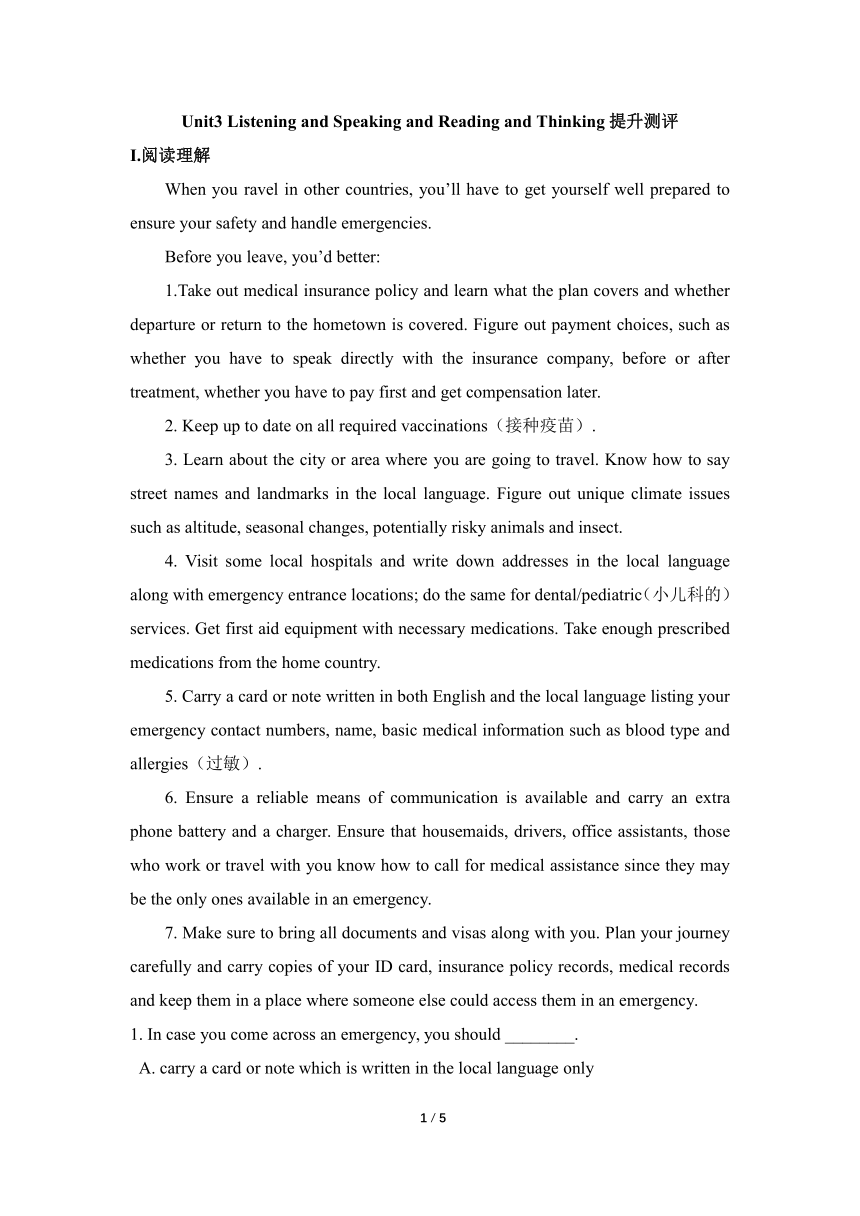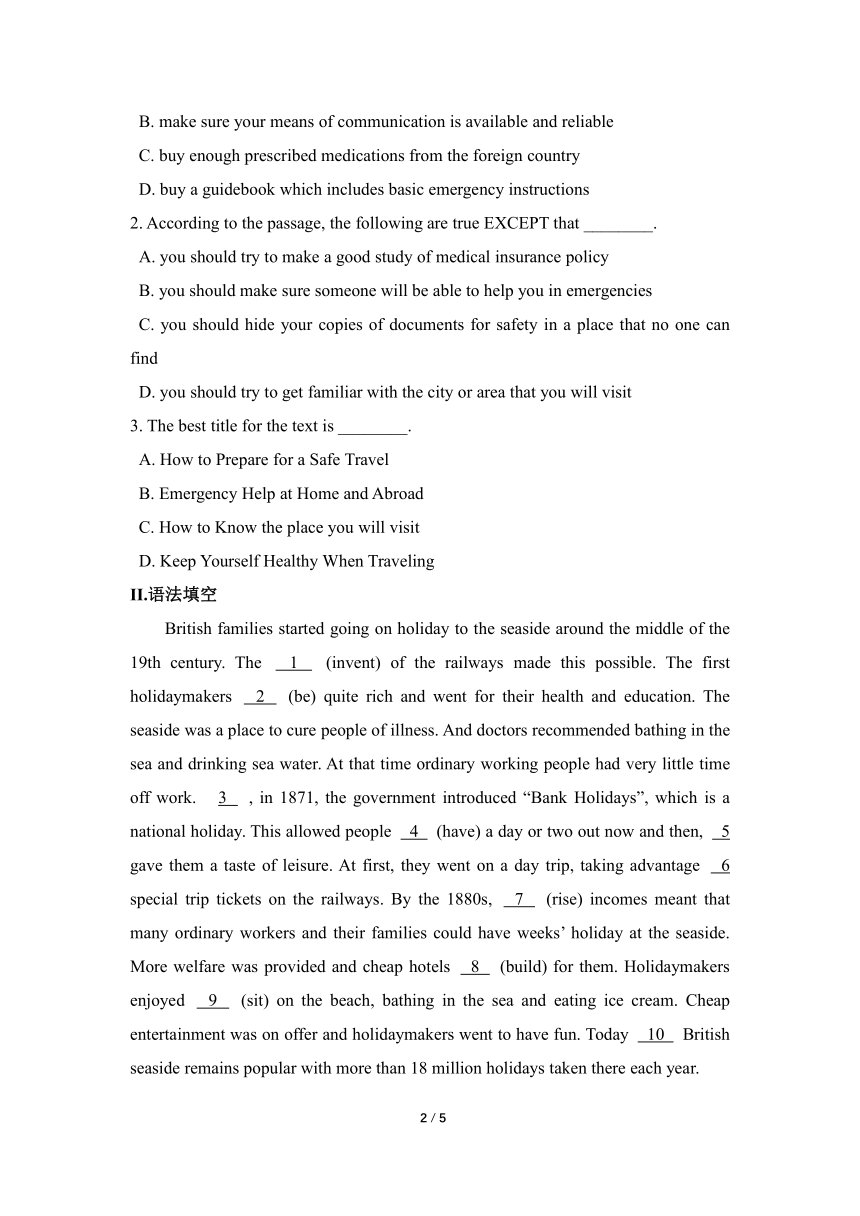人教版(2019)必修第三册 Unit3 Diverse Cultures Listening and Reading and Thinking提升测评(有答案)
文档属性
| 名称 | 人教版(2019)必修第三册 Unit3 Diverse Cultures Listening and Reading and Thinking提升测评(有答案) |  | |
| 格式 | docx | ||
| 文件大小 | 17.0KB | ||
| 资源类型 | 教案 | ||
| 版本资源 | 人教版(2019) | ||
| 科目 | 英语 | ||
| 更新时间 | 2023-03-10 18:25:09 | ||
图片预览


文档简介
Unit3 Listening and Speaking and Reading and Thinking提升测评
Ⅰ.阅读理解
When you ravel in other countries, you’ll have to get yourself well prepared to ensure your safety and handle emergencies.
Before you leave, you’d better:
1.Take out medical insurance policy and learn what the plan covers and whether departure or return to the hometown is covered. Figure out payment choices, such as whether you have to speak directly with the insurance company, before or after treatment, whether you have to pay first and get compensation later.
2. Keep up to date on all required vaccinations(接种疫苗).
3. Learn about the city or area where you are going to travel. Know how to say street names and landmarks in the local language. Figure out unique climate issues such as altitude, seasonal changes, potentially risky animals and insect.
4. Visit some local hospitals and write down addresses in the local language along with emergency entrance locations; do the same for dental/pediatric(小儿科的)services. Get first aid equipment with necessary medications. Take enough prescribed medications from the home country.
5. Carry a card or note written in both English and the local language listing your emergency contact numbers, name, basic medical information such as blood type and allergies(过敏).
6. Ensure a reliable means of communication is available and carry an extra phone battery and a charger. Ensure that housemaids, drivers, office assistants, those who work or travel with you know how to call for medical assistance since they may be the only ones available in an emergency.
7. Make sure to bring all documents and visas along with you. Plan your journey carefully and carry copies of your ID card, insurance policy records, medical records and keep them in a place where someone else could access them in an emergency.
1. In case you come across an emergency, you should ________.
A. carry a card or note which is written in the local language only
B. make sure your means of communication is available and reliable
C. buy enough prescribed medications from the foreign country
D. buy a guidebook which includes basic emergency instructions
2. According to the passage, the following are true EXCEPT that ________.
A. you should try to make a good study of medical insurance policy
B. you should make sure someone will be able to help you in emergencies
C. you should hide your copies of documents for safety in a place that no one can find
D. you should try to get familiar with the city or area that you will visit
3. The best title for the text is ________.
A. How to Prepare for a Safe Travel
B. Emergency Help at Home and Abroad
C. How to Know the place you will visit
D. Keep Yourself Healthy When Traveling
II.语法填空
British families started going on holiday to the seaside around the middle of the 19th century. The 1 (invent) of the railways made this possible. The first holidaymakers 2 (be) quite rich and went for their health and education. The seaside was a place to cure people of illness. And doctors recommended bathing in the sea and drinking sea water. At that time ordinary working people had very little time off work. 3 , in 1871, the government introduced “Bank Holidays”, which is a national holiday. This allowed people 4 (have) a day or two out now and then, 5 gave them a taste of leisure. At first, they went on a day trip, taking advantage 6 special trip tickets on the railways. By the 1880s, 7 (rise) incomes meant that many ordinary workers and their families could have weeks’ holiday at the seaside. More welfare was provided and cheap hotels 8 (build) for them. Holidaymakers enjoyed 9 (sit) on the beach, bathing in the sea and eating ice cream. Cheap entertainment was on offer and holidaymakers went to have fun. Today 10 British seaside remains popular with more than 18 million holidays taken there each year.
1. ________ 2. ________ 3. ________ 4. ________ 5. ________
6. ________ 7. ________ 8. ________ 9. ________ 10. ________
答案:
I.语篇解读:本文是一篇说明文,介绍了安全旅行的准备工作和注意事项。
1.B 细节理解题。根据文章的第五条建议排除A项:根据文章的第四条建议排除C项;根据文章的第七条建议排除D项;根据文章的第六条建议中“Ensure a reliable means communication is available and…”可确定答案为B项。
2.C 细节理解题。根据文章的第一条建议可知A项正确;根据文章的第六条建议可知B项正确;根据文章的第三条建议可知D项正确;根据文章的第七条建议中“Plan your journey carefully and carry copies of your ID card, insurance policy records,medical records and keep them in a place where someone else could access them in an emergency.”可知C项错误,故选C。
3.A 主旨大意题。通读全文,并根据文章第一段的“you’ll have to get yourself well prepared to ensure your safety and handle emergencies”可知本文主要介绍的是如何为一次安全旅行做准备,故选A。
II.语篇解读:本文介绍了几十年来英国人度假形式的变化情况。大约在19世纪中期,英国家庭开始去海边度假铁路的发明也为其流行提供了条件。当时,能够支付去海边度假的费用的多是富裕的家庭。
1. invention 考查名词。the invention of the railways铁路的发明。
2. were 考查动词的时态和主谓一致。句子主语是The first holidaymakers,为复数。全文以一般过去时为主,故此处时态与全文保持一致。
3. However 由语境可知上下文之间是转折关系,结合后面的逗号可知填 However。
4. to have 考查非谓语动词。allow sb.to do sth.允许某人做某事。此处表示这一做法使人们有了一两天的假。动词不定式 to have作宾语补足语。
5. which 考查关系代词。此处 which引导非限制性定语从句并在从句中作主语。
6. of 考查固定短语。take advantage of利用。
7. rising 考查非谓语动词。分析句子可知,设空处用动名词作定语修饰名词 incomes。
8. were built 考查动词的语态和时态。句意:提供了更多的福利,也为他们修建了便宜的旅馆。cheap hotels与build之间为被动关系。由前面的was可知这里用一般过去时。
9. sitting 考查非谓语动词。enjoy doing sth.意为“喜欢做某事”。
10. the 考查定冠词。此处特指 British seaside,故用定冠词the。
2 / 2
Ⅰ.阅读理解
When you ravel in other countries, you’ll have to get yourself well prepared to ensure your safety and handle emergencies.
Before you leave, you’d better:
1.Take out medical insurance policy and learn what the plan covers and whether departure or return to the hometown is covered. Figure out payment choices, such as whether you have to speak directly with the insurance company, before or after treatment, whether you have to pay first and get compensation later.
2. Keep up to date on all required vaccinations(接种疫苗).
3. Learn about the city or area where you are going to travel. Know how to say street names and landmarks in the local language. Figure out unique climate issues such as altitude, seasonal changes, potentially risky animals and insect.
4. Visit some local hospitals and write down addresses in the local language along with emergency entrance locations; do the same for dental/pediatric(小儿科的)services. Get first aid equipment with necessary medications. Take enough prescribed medications from the home country.
5. Carry a card or note written in both English and the local language listing your emergency contact numbers, name, basic medical information such as blood type and allergies(过敏).
6. Ensure a reliable means of communication is available and carry an extra phone battery and a charger. Ensure that housemaids, drivers, office assistants, those who work or travel with you know how to call for medical assistance since they may be the only ones available in an emergency.
7. Make sure to bring all documents and visas along with you. Plan your journey carefully and carry copies of your ID card, insurance policy records, medical records and keep them in a place where someone else could access them in an emergency.
1. In case you come across an emergency, you should ________.
A. carry a card or note which is written in the local language only
B. make sure your means of communication is available and reliable
C. buy enough prescribed medications from the foreign country
D. buy a guidebook which includes basic emergency instructions
2. According to the passage, the following are true EXCEPT that ________.
A. you should try to make a good study of medical insurance policy
B. you should make sure someone will be able to help you in emergencies
C. you should hide your copies of documents for safety in a place that no one can find
D. you should try to get familiar with the city or area that you will visit
3. The best title for the text is ________.
A. How to Prepare for a Safe Travel
B. Emergency Help at Home and Abroad
C. How to Know the place you will visit
D. Keep Yourself Healthy When Traveling
II.语法填空
British families started going on holiday to the seaside around the middle of the 19th century. The 1 (invent) of the railways made this possible. The first holidaymakers 2 (be) quite rich and went for their health and education. The seaside was a place to cure people of illness. And doctors recommended bathing in the sea and drinking sea water. At that time ordinary working people had very little time off work. 3 , in 1871, the government introduced “Bank Holidays”, which is a national holiday. This allowed people 4 (have) a day or two out now and then, 5 gave them a taste of leisure. At first, they went on a day trip, taking advantage 6 special trip tickets on the railways. By the 1880s, 7 (rise) incomes meant that many ordinary workers and their families could have weeks’ holiday at the seaside. More welfare was provided and cheap hotels 8 (build) for them. Holidaymakers enjoyed 9 (sit) on the beach, bathing in the sea and eating ice cream. Cheap entertainment was on offer and holidaymakers went to have fun. Today 10 British seaside remains popular with more than 18 million holidays taken there each year.
1. ________ 2. ________ 3. ________ 4. ________ 5. ________
6. ________ 7. ________ 8. ________ 9. ________ 10. ________
答案:
I.语篇解读:本文是一篇说明文,介绍了安全旅行的准备工作和注意事项。
1.B 细节理解题。根据文章的第五条建议排除A项:根据文章的第四条建议排除C项;根据文章的第七条建议排除D项;根据文章的第六条建议中“Ensure a reliable means communication is available and…”可确定答案为B项。
2.C 细节理解题。根据文章的第一条建议可知A项正确;根据文章的第六条建议可知B项正确;根据文章的第三条建议可知D项正确;根据文章的第七条建议中“Plan your journey carefully and carry copies of your ID card, insurance policy records,medical records and keep them in a place where someone else could access them in an emergency.”可知C项错误,故选C。
3.A 主旨大意题。通读全文,并根据文章第一段的“you’ll have to get yourself well prepared to ensure your safety and handle emergencies”可知本文主要介绍的是如何为一次安全旅行做准备,故选A。
II.语篇解读:本文介绍了几十年来英国人度假形式的变化情况。大约在19世纪中期,英国家庭开始去海边度假铁路的发明也为其流行提供了条件。当时,能够支付去海边度假的费用的多是富裕的家庭。
1. invention 考查名词。the invention of the railways铁路的发明。
2. were 考查动词的时态和主谓一致。句子主语是The first holidaymakers,为复数。全文以一般过去时为主,故此处时态与全文保持一致。
3. However 由语境可知上下文之间是转折关系,结合后面的逗号可知填 However。
4. to have 考查非谓语动词。allow sb.to do sth.允许某人做某事。此处表示这一做法使人们有了一两天的假。动词不定式 to have作宾语补足语。
5. which 考查关系代词。此处 which引导非限制性定语从句并在从句中作主语。
6. of 考查固定短语。take advantage of利用。
7. rising 考查非谓语动词。分析句子可知,设空处用动名词作定语修饰名词 incomes。
8. were built 考查动词的语态和时态。句意:提供了更多的福利,也为他们修建了便宜的旅馆。cheap hotels与build之间为被动关系。由前面的was可知这里用一般过去时。
9. sitting 考查非谓语动词。enjoy doing sth.意为“喜欢做某事”。
10. the 考查定冠词。此处特指 British seaside,故用定冠词the。
2 / 2
